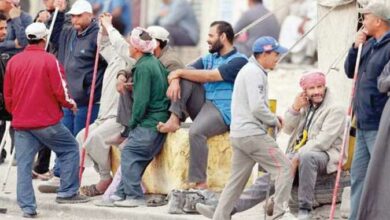In the heat of the day, about 30 workers from the Amonsito textile factory huddled under the shade of a tree.
“We are not workers, we are rejects,” the factory union leader Khaled el-Shishawy, who is known simply as sheikh Khaled told Al-Masry Al-Youm.
After 55 days of waiting following one delay after another, the factory’s workers returned to their prior sit-in location on the sidewalk outside the Shura Council in Downtown Cairo.
Surrounded by his co-workers, sheikh Khaled was obviously shaken–a change from his last appearance at the gate of upper house of the Egyptian parliament.
On 21 March, the union head spoke with visible confidence over a loudspeaker, reading to over 1000 workers the contents of a recently-concluded agreement. His audience then spilled over into the busy Qasr el-Aini Street. For once, the security forces were not hostile. For such a sight after all, according to statements made recently by Prime Minister Ahmed Nazif, is a sign of Egypt’s democracy.
The sit-in proved a successful tool to put pressure on the government and the Bank Misr representative, who signed an agreement on 21 March providing end-of-service payment packages for the company’s 1700 workers. Yet the bank has remains unwilling to make the promised payments.
Hussein Megawer, the head of the state-run Egyptian Trade Union Federation Hussein, has ignored the el-Shishawy’s requests for intervention in the agreement that was to be overseen by the Egyptian government.
Megawer has refused to help the workers secure their pay, el-Shishawy said.
“In two days, school will be out and our children will be joining us here,” said the undeterred union leader.
Many of the workers didn’t watch President Mubarak’s labor day speech on 6 May. Standing on the sidewalk, the union head watched some of the speech on a mobile phone but turned it off halfway through.
“How long will they keep lying to us?” one of the workers asked.
In the speech, Mubarak repeatedly expressed his support for Egyptian workers. At one point, the president claimed that strikes would negatively affect Egypt’s economy, thus indirectly appealing to workers to refrain from taking such actions.
In the case of the Amonsito workers, striking is not even a possibility. For almost three years the Ministry of Manpower and Immigration has occasionally paid partial salaries in the absence of factory owner Adel Agha. The Syrian-American business tycoon fled Egypt in 2007 and responsibility for the factory was assumed by the ministry and Bank Misr, the owner’s crediting bank.
On March 30, Nagui Rashad, an employee of the Southern Giza Mills, won a court case against the president, prime minister and minister of planning requiring them to implement a minimum wage for Egypt’s workforce in accordance with changing prices by 1 May.
When the minimum wage wasn’t implemented, workers and activists held a protest before the Council of Ministers on 2 May calling on the government to comply with the court’s decision.
The Amonsito workers did not attend the 2 May protest. For them, such a minimum wage is a pipe dream. Right now, their priorities lie elsewhere: They are simply calling for any wage, regardless of the amount, if the factory returns to functionality. If the factory owner or his crediting bank won’t re-start the factory, the workers want their end of service payments.
Many of the workers have served in the factory for up to 25 years and refuse to walk away from their life’s work empty handed.
“We will not leave here with just an agreement again,” sheikh Khaled said. “Until the bank comes and hands each worker their paycheck, no one will leave here.”
Egypt




